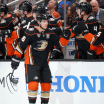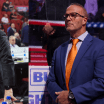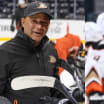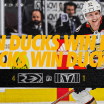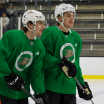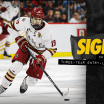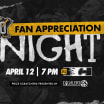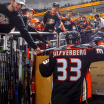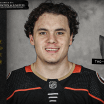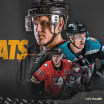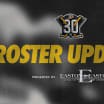June 2003 would turn out to be a seminal month for the Anaheim Ducks, a major crossroads in the growth of a franchise that would ultimately emerge into a perennial championship contender and ultimately a Stanley Cup champion.
The 2003 Draft: One for the Ages
The Ducks selected franchise icons Ryan Getzlaf and Corey Perry in what is widely considered the best NHL Draft in history
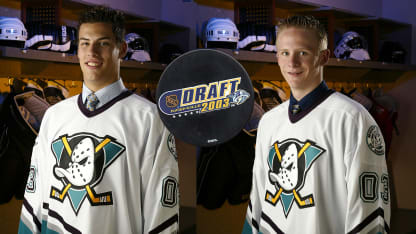
In just their 10th year of existence, the then Mighty Ducks made an inspiring postseason run all the way to the Stanley Cup Final, where they lost in Game 7 to the New Jersey Devils. J.S. Giguere, the goalie who practically carried those Mighty Ducks on his back throughout the playoffs, was awarded the Conn Smythe Trophy as postseason MVP, becoming just the fifth player in NHL history to win the award while playing for the losing team.
Just 12 days after that Game 7 defeat, the focus turned on building for the future at the 2003 NHL Entry Draft at what was then known as Gaylord Entertainment Center in Nashville, Tennessee. It was a draft that would later become renowned as arguably the best and most talent-laden in NHL history. For the Ducks it was especially fruitful, as they selected two eventual franchise cornerstones - Ryan Getzlaf with the 19th overall pick and Corey Perry with the 28th.
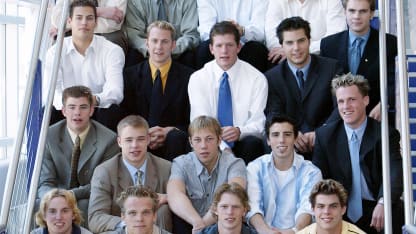
"For whatever reason, it was just one of those years. Every now and then you get a draft year that's just off the charts, and that was one of them," says David McNab, the Ducks Senior Vice President of Hockey Operations who has been with the organization since its birth in 1993. "Even before the draft, everyone recognized there was a good chance you could get a good player, even late in the first round or beyond. The number of guys who have been significantly important players to franchises is incredible."
Fifteen years later, almost half of the players selected in the first round of that draft are still active in the NHL and have made major impacts on the teams that took them. Every pick played at least a game in the NHL and 22 of the 30 have played at least 500. All but nine selected in the second round also reached the NHL. Including Getzlaf and Perry, a staggering 28 players were named an NHL All-Star at least once in their careers (17 from the first round alone).
It starts at the top with Marc-Andre Fleury, selected by the Pittsburgh Penguins as one of the few goalies to go No. 1 overall. Fleury backstopped the Penguins to three Stanley Cup titles and just carried the Vegas Golden Knights to the Final in the expansion franchise's first year of existence.
Center Eric Staal, the second overall pick by the Hurricanes, became an icon of that franchise and helped the Canes to a Stanley Cup title in 2006. Staal (now with Minnesota) remains the top scorer from that draft with 922 points, but Getzlaf (875) and Perry (766) are second and third, respectively. Perry's 366 goals trails only Staal's 395, remarkable considering Perry lasted until the 28th pick (more on that later).
Other standouts from that first round include forwards Thomas Vanek (fifth), Jeff Carter (11th), Dustin Brown (13th), Zach Parise (17th) Brian Boyle (26th) and two players who ended up becoming Anaheim Ducks - Ryan Kesler (23rd) and Patrick Eaves (29th). The defensemen include Braydon Coburn (eighth), Dion Phaneuf (ninth), Brent Seabrook (14th), Brent Burns (20th) and Mark Stuart (21st).
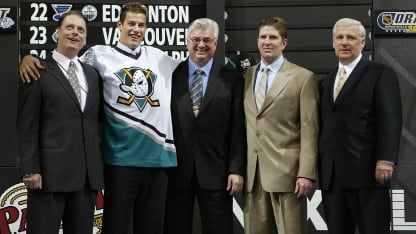
But the talent didn't end with the first round. Forwards Loui Eriksson (33rd), Patrice Bergeron (45th) and David Backes (62nd) and defenseman Shea Weber (49th) and goaltender Corey Crawford (52nd) were picked in the second round. Kyle Quincey (132nd) was a fourth-round pick. Lee Stempniak (148th) was a fifth-rounder. Marc Methot (168th) and Drew Miller (186th) were picked in the sixth, with Joe Pavelski (205th) and Kyle Brodziak (214th) going in the seventh.
These days there is no eighth round in the NHL Draft, but back then Toby Enstrom (239th) and Dustin Byfuglien (245th) were steals in the eighth and Matt Moulson (263rd), Tanner Glass (265th), Jaroslav Halak (271st), Chris Porter (282nd), David Jones (288th) and Brian Elliott (291st) were each plucked in the ninth - Elliott with the second-to-last-pick of the entire draft.
The stories behind the Ducks getting Getzlaf and Perry are intriguing as well. "It's very weird to think it's been 15 years and how the time has gone by so fast," said Getzlaf recently while reflecting on that day. "It was obviously a nervous day with family involved and getting everything organized. Things are a little hectic."
Getzlaf, the big center from the Calgary Hitmen of the WHL, was ranked in the top 5 among North American Skaters in the final Central Scouting Rankings but remained unpicked until the Ducks picked 19th.
"It was bittersweet because I was ranked to go a little bit higher than I did, so you're sitting there in your seat, kind of sweating what's going on," says the now 33-year-old Ducks captain. "There are doubts going through your mind and all that stuff. All of a sudden your name gets called and it all goes away. It's an exciting time."
Getzlaf had anticipated going to the Rangers at No. 12. "They had told me if I was there they were going to take me," he recalls. "So that was really the only disappointing pick that went by where I was like, 'Wait, what happened?' After that we were just waiting."
Ironically, the Rangers instead took Hugh Jessiman, a right winger from Dartmouth who ended up being one of the few first-rounders not to make an impact in the league. He never appeared in a game with the Rangers, and played his only two career NHL games in 2011 with Florida.
Six more picks went by without Getzlaf's name being called until the Ducks were thrilled to see him on the board when they were on the clock with the 19th.
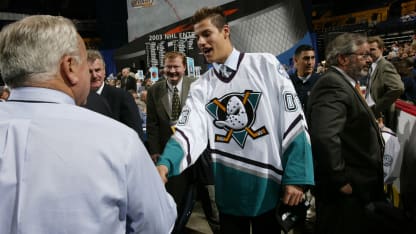
"The standard line when you see any draft is, 'I was surprised he was still there,'" McNab says. "But yes, after the fact, people were surprised Getzlaf lasted that long, but they weren't stunned that he was available. When you look at the list, there were an awful lot of really good players to choose from. Even the guys who haven't done that well in the NHL had spectacular years going into the draft. It's one of those things, where probably six or seven teams could have easily taken him but they chose another player. That's the way the draft goes."
The Ducks brass hadn't even met with Getzlaf before the draft, assuming he would be gone by the time they picked. "At the time it was a little bit weird because I had met with every team except Anaheim and one other team," Getzlaf says. "But it was exciting when they took me."
Getzlaf, who had never been to California before, admits he didn't know much about the organization other than its playoff run just a few weeks prior. "The one thing I knew about the Ducks was that [Joffrey] Lupul was in the organization, and I had played against him in junior all the time. And he was a good player in junior, so that was an exciting thing."
While Getzlaf didn't know Perry all that well prior to the draft, the two would become intertwined not long after the right winger was taken by the Ducks 28th later that day. "I knew Perry a little bit from World Junior camp and some other camps, but we didn't really know each other very well. I knew he was a right winger, and the Ducks obviously had something in mind when they put us together."
But getting Perry was almost not meant to be for Anaheim, which didn't even have another first round pick until they did some late maneuvering to acquire the 28th overall selection from Dallas. Perry had shown scoring prowess and grit with the London Knights of the OHL, but questions about his skating kept teams away from him for most of the first round.
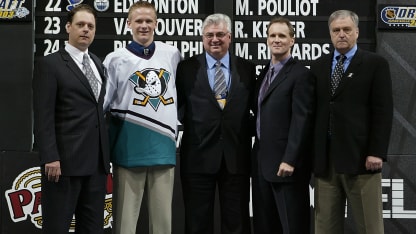
"When someone gets a quote-unquote reputation about something as critical as that - whether it's fair or unfair - it can really affect things," McNab says. "The Getzlaf pick was easy for our scouts to make. But with the Perry pick, it was a situation where he was the guy our guys wanted the most when it came close to that point in the draft."
Not long after the Getzlaf selection, Ducks GM Bryan Murray started approaching teams on the draft floor offering Anaheim's two second round picks for a first. "Our guys wanted to get Corey. If he had been picked, we would have kept our two seconds. He's the guy our scouts wanted the most in that situation. Bryan had to go to the next team picking and make an offer. We'd listen to see who the choice was, and when it wasn't Corey, he'd go to the next team and make the same offer."
Ultimately it was Dallas who accepted, giving Anaheim the 28th in exchange for the 36th and 54th. The Stars used those picks on Vojtech Polak (5 career NHL games) and B. J. Crombeen (26 goals in 445 games before retiring in 2015).
Anaheim could rest easy throughout that second round, instead reveling in their selections of Getzlaf and Perry. "We were very excited to get them both because we really liked them as players," McNab says. "We had both of them ranked a lot higher than where we ended up getting them."
The two were born just six days apart (Getzlaf on May 10, 1985 and Perry on May 16) and since that June day they would become so intertwined they're frequently called "The Twins" despite looking nothing alike. "Coming into that first training camp," Getzlaf says, "our friendship was already being built."
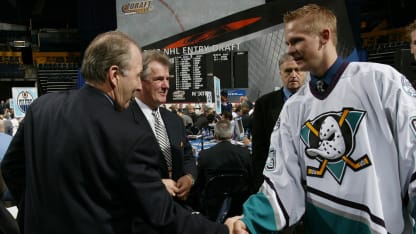
They have spent the majority of the last 15 years playing on the same forward line, developing a chemistry that has rivaled any duo in hockey over that stretch. They haven't always done it together, but "Getz" and "Pears" have racked up 613 goals and 1,641 points combined in the regular season and another 73 goals and 209 points in 143 playoff games.
And they've won. A lot. Along with helping the Ducks capture California's First Cup in 2007, they each won two gold medals for Team Canada (in 2010 and 2014). Perry, in particular is unique in the game's history as only the second player (joining former Ducks captain Scott Niedermayer) to win the Stanley Cup, Olympic gold medal, World Championship, World Junior Championship, Memorial Cup and World Cup titles.
Perry scored a career-high 50 goals in 2010-11 to win the Hart Trophy as the league's MVP. Getzlaf has been top 10 in the Hart voting three times, including a runner-up finish to Sidney Crosby in 2014.
As Assistant General Manager at the time, McNab admits he didn't have a major hand in the scouting and evaluation of the draft's prospects. Instead he emphasizes the role played by then general manager Murray and especially scouts Tim Murray and Alain Chaney in seeing the potential in Getzlaf and Perry.
"Fifteen years later, and they're still here and they're still important players," McNab says. "I don't know if any other team has gotten two cornerstone players from that draft who are still with that franchise. That's part of the uniqueness of that draft for us. When you get two players who have been really good and been around for a long tie and been very instrumental in everything that has happened with the franchise since then, it's impressive."

